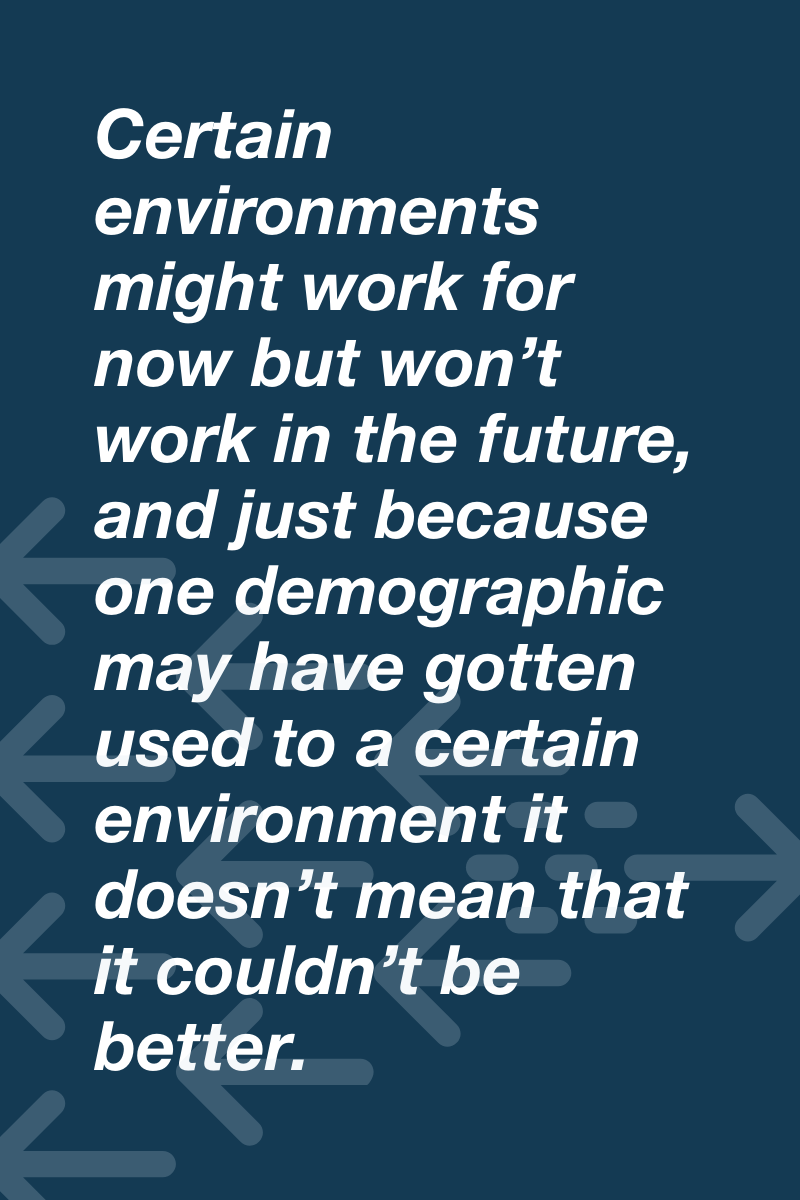How to Help Gen Z Change the Workplace for the Better
One challenge that many Canadian business leaders are currently faced with is the entrance of a new generation in the workplace. This change presents both complications and opportunities for organizations. Navigating the new values, perspectives, and expectations that Generation Z brings into the workplace can be challenging for both parties, but the rewards can be multiplied if faced with care and attentiveness.
Here’s how.
Millennials, Then and Now
In Simon Sinek’s viral video on millennials entering the workforce, from seven years ago, he observes the challenges that employers face with their newer employees adjusting to the workplace. He blames their failure—to no fault of their own—on four factors: parenting, technology, impatience, and the environment. These problems are compounded to create a lack of engagement, motivation, and productivity.
According to Simon, it’s the responsibility of organizations to pick up the slack in educating this generation where the rest of society has failed them. As the aging population begins to retire in great numbers, businesses that seek to understand new generations and are willing to make changes can improve the work environment for everyone.
Seven years later, after Sinek’s famous speech, millennials are successful entrepreneurs, or stepping into management and leadership positions while driving productivity and fostering positive change in the workplace. Now, a new generation, Generation Z (Gen Z), is entering the workforce, and employers are having to adapt along with them. By taking a lesson from previous experience, we now know that we can use our differences to excel and innovate rather than clash and disintegrate.
The Tradition of Difference
Truthfully, this clash between generations is nothing new. We have been at odds with one another since time immemorial. Below is a quote from Peter the Hermit, who was a Roman Catholic priest and credited as the leader of the People’s Crusade in 1096, which included the massacre of up to 12,000 people based on religious differences.
« The world is passing through troublous times. The young people of today think of nothing but themselves. They have no reverence for parents or old age. They are impatient of all restraint. They talk as if they knew everything, and what passes for wisdom with us is foolishness with them. »
Surprisingly, this quote could be something you might hear in a modern context, other than some of the antiquated diction.
While we might think that the new youths are particularly different from others, this example reveals that generational differences are prevalent throughout history. In business, we can leverage our differences through alternate perspectives to sustain resiliency in the ever-changing economic environment.
Frogs in Boiling Water
Younger generations seek to challenge the status quo, naturally. They ask why certain practices are in place and if those practices have to stay that way. Certain environments might work for now but won’t work in the future, and just because one demographic may have gotten used to a certain environment it doesn’t mean that it couldn’t be better.
A frog placed into boiling water will jump out immediately but increase the temperature slowly and it will not perceive any danger and get cooked. In this metaphor, younger generations are the frogs entering a boiling pot, and the boiling pot is the current environment. Older generations are the frogs who have been in the water since it was tepid and may not have noticed that it is now boiling.
Each generation is responsible for making a productive change by announcing to the rest of us that the water is indeed boiling. Millennials, for example, played a significant role in pushing for work-life balance and flexibility. Generation X brought authenticity and creativity to the workplace. Baby Boomers spearheaded social change and built many of the systems we rely on today with a hard-work mentality.

Gen Z’s Contribution to the Workplace
Gen Z is already making a positive change too. They are the first fully digital native generation. They have been exposed to unlimited information and misinformation, economic uncertainty, and a social uprising. As a result, they value transparency, security, pay equity, purpose, and autonomy. Many of their contributions are yet to be fully realized, as their entrance into the workplace is still relatively new and ongoing. It will become more clear as we find ways to support them in their growth.
The following are some ways you can support young employees in creating success for themselves and your organization:
In-Person Interactions
Offering opportunities for co-workers to meet face-to-face, if possible, will help develop personal connections, which will greatly contribute to engagement, fulfillment, and employee retention. Remote work and the COVID-19 pandemic have created a disconnect in the workplace, particularly for Gen Z, who started their careers in this environment.
Flexibility and Autonomy
Gen Z seeks to make decisions independently. Offering them the opportunity to take charge of their schedule and workflow—to an extent—gives them the chance to prove themselves and will increase motivation and engagement.
Supportive Culture
Working to create an open culture that allows for vulnerability can encourage supportive relationships and well-being. According to surveys conducted by McKinsey, Gen Z is least likely to reach out for help when they need it, either personally or professionally. When applying for jobs, they look for companies that value mental health and understand its significance in contributing to performance.
Feedback
Younger team members may be learning to gauge their impact and success for the first time. Simon Sinek credits this lack of situational awareness to participation medals that became popular in the 90s. Providing constructive, ongoing feedback, with real-life examples, and asking for their input will help them reflect on their contributions and support their self-awareness.
Sharing Purpose
Gen Z is largely purpose-driven. Sharing your company values and the good you do as an organization, while embedding your culture and operations with that same mission, will encourage them to get engaged and make their respective impact.
Like anyone, Gen Z wants to contribute positively to our world and communities and require nurturing to do so. As business leaders, you have the opportunity to contribute positively to the lives of our younger generations in a way that mutually benefits our individual and collective ambitions.
For more information on the PESTEL topics that TEC Canada has highlighted for business leaders to be aware of, visit our latest blog on AI, Misinformation, and policy.


